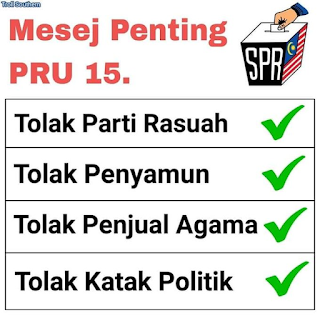It shouldn’t be difficult for opposition leader Anwar Ibrahim to give the Tambun incumbent, the former Perak mentri besar Ahmad Faizal Azumu, also known as Peja, a bloody nose. The Bersatu deputy president, who is also the youth and sports minister, is not popular amongst ordinary Malaysians.
If Anwar (above, right) can solve Tambun’s problems, and by association, the issues troubling Ipoh and Perak, then he should not have a problem winning our vote.
Despite his lack of academic qualifications, Peja (above, left) achieved a meteoric rise up the greasy pole of politics. He possesses one stellar achievement, which is the art of ampu-bodek (grovelling), but he does not mind the negative comments about his lack of commitment, because he is handsomely rewarded for switching sides.
He was made mentri besar, then briefly became a special adviser to a former PM, and despite his mediocrity, was made a minister.
Peja also has exceptional skill in switching sides, and it is difficult keeping up with his revolving door allegiances. His early career was in Umno-Baru, but in the run-up to the 14th general election (GE14), he switched sides to Bersatu which was then part of Pakatan Harapan, and later Perikatan Nasional following the “Sheraton Move”.
A disastrous MB
The orang asli in the constituency of Chenderiang felt betrayed by Peja, who encouraged crony timber barons to encroach onto their ancestral land in 2018. When criticised, Peja blamed the orang asli for failing to improve themselves.
As menteri besar, Peja awarded multi-million ringgit forestry projects to companies with RM2 paid-up capital. No open tenders were involved, and when netizens attacked him, he brushed aside their criticisms.
Ipoh folks were furious that Bukit Kledang, overlooking Menglembu was denuded, and residents who lived lower down the hill were fearful of being buried in landslides after nonstop heavy rains. The arrogant Peja ignored residents' concerns.
Malaysians were also angry that Peja was one of the main architects in the Sheraton Move of 2020. He flip-flopped from one policy to another. He did little to support athletes when he became the youth and sports minister.
As mentri besar, he was weak and ineffective, wasted money on white elephant projects such as the money-sucking MAPS theme park. He did very little about stopping environmental degradation and was clueless about attracting young talent to return and rebuild Perak.
So, is Anwar up to the task of giving Peja a good thrashing? At one time, Tambun, like Ipoh, Kampar, Batu Gajah, and Tapah, was rich. These towns were built with tin money and were populated by millionaires.
Along came former PM Dr Mahathir Mohamad and his Maminco project to corner the London tin market. Almost overnight, these millionaire havens became ghost towns. Mahathir could not have cooked up a better plan to rid Ipoh and its environs of the Chinese tycoons and their influence.
Will Anwar be able to rejuvenate Tambun and the Kinta Valley? It is an open secret that there are many officials on the take and many indiscriminate developments take place in the area.
Environmental destruction for ‘development’
Development is not just about building gleaming structures of concrete and steel. There is also mental and social development. Will Anwar get rid of the parochial attitudes of the administration in Perak? Does he have a creative team who will prevent young Perakians from seeking their fortunes in other states, or overseas? Our schools are struggling.
When Harapan was briefly in power in 2018, the destruction of the limestone hills was halted. Umno-Baru resumed this destruction; will Anwar stop it again?
Anwar should stand in the middle of Tambun town and look at the surrounding limestone hills. They are fast disappearing. Successive Umno-Baru MPs and administrations have done little to preserve the beauty of Ipoh, and its karst hills. These limestone outcrops are what give the Kinta valley its beauty.
The destruction can be clearly seen if Anwar were to approach Tambun from the North-South highway because on either side of him, the limestone hills are being blown to smithereens. Any caves and archaeological treasures would not have survived the explosions.
Few developers in the area care. Their concern is to flatten the hills and erect concrete jungles and skyscrapers. They ignore the drainage of the area, so flash floods are common. Further north, illegal sand mining is common.
On the outskirts of Tambun, vegetable farmers have had several run-ins with the authorities. Farmers, who have tilled the lands for at least four generations, are being evicted. Malaysia has a serious problem with food security, but the government pays lip service to this problem.
Why not help the farmers who grow cheap vegetables, not just for the local trade, but also for export to Singapore? Anwar should look into this problem. We lack an efficient public transport system. Despite all the promises, the administration has failed the Kinta Valley residents. Litter is also a huge problem. The place lacks a cohesive education campaign about littering, and enforcement to punish fly-tippers is haphazard at best.
Politics is a nasty business in Malaysia and it is particularly bad, in Perak Look at how the convict Najib Abdul Razak destroyed the state’s democracy in 2009. Corruption and tribal politics have become a way of life.
Anwar can accomplish a lot in Perak, but he should do less talking. He should show us what he is capable of. Show, not tell. Act, not talk. Prove it in Tambun and even his worst sceptics might back him all the way to Putrajaya. - Mariam Mokhtar.mk
Ayor ke Ayaq ke jangan sampai tak makan...
GE15: Let the games begin...
It is our hope that on November 19, all the 21.17 million eligible voters in the country will exercise their rights and use the ballots in their hands to pick the right people who will inject a new lease of life into the country’s future!
EC chairman Abdul Ghani Salleh announced on Thursday that the polling day of the 15th general election will fall on November 19 (Saturday) while nomination is on November 5 (Saturday), with 14 days of campaigning.
Caretaker prime minister Ismail Sabri Yaakob announced the dissolution of parliament on October 10 to pave way for an early general election. As a matter of fact, it is not too hard to fix the nomination and polling dates, but it seems that EC needed to take ten whole days to make the announcement.
His Majesty Yang di-Pertuan Agong has earlier hoped that the election would be held as soon as possible, but the November 19 polling day may likely not avert a soggy monsoon season.
The 15th general election will be using the supplementary electoral roll updated as on August 9 this year, with a total of 21,173,638 eligible voters or 6.23 million more than the 14.94 million in the last election. These first-time voters will make up a major factor of uncertainty in the upcoming election and their voting trends will very likely affect the final outcome.
222 members of parliament will be elected in GE15, although quite many states are not going to hold their state elections concurrently. Only three states – Pahang, Perak and Perlis will have 116 state assembly seats up for grabs in this election.
Separate parliamentary and state elections would invariably bring down the voter turnout, and observers are of the view that a lower voter turnout will work in the favor of Barisan Nasional because it was the unusually high 82.32% voter turnout in 2018 that brought about the first ever change in federal administrative in the country’s history.
Unfortunately, anti-establishment sentiment is not expected to be wholly duplicated this time. None of the three major political camps – BN PN and PH have what it takes to reignite the people’s enthusiasm to go out and vote. Even if the polling day falls on a Saturday, we may not see a repeat of what took place four years ago when voters traveled back to their hometowns to vote in the middle of a working week.
The voter turnout will very likely slip back to around 70%, even if such a rate already makes many democratic countries green with envy. Will BN benefit from such a low turnout? Let’s just wait and see! The imminent monsoon floods could also affect the voter turnout and hence the final outcome.
Starting from next month, the northeast monsoon is expected to bring tons of rainfall to the peninsula. The Met’s historical statistics show that it is extremely rare for three east coast states of Pahang, Terengganu and Kelantan not to be inundated after mid-November.
As such, PAS votes in its fortress states of Kelantan and Terengganu will likely be thinned, especially in the absence of state elections, and this is going to give BN a possible boost. The 14 days of campaign period should be more than enough for parties to nominate and campaign for their candidates because it is still three days longer than in the last election.
But due to the decision to rush through the election before the floods arrive, the EC will only start printing the ballot papers after the nomination, and many overseas voters may not have enough time to receive and send back their postal votes. The chaos arising from postal voting in the last election is set to repeat itself this time. Although Global Bersih has urged the EC to give at least 21 days for campaigning to make sure all overseas postal votes could be sent back in time, they are going to be disappointed again this time.
The two weeks from Thursday until November 5 nomination day will mark a crucial moment for the three major political camps to allocate the seats optimally among their component parties. There’s no point fielding more candidates in unwinnable constituencies. For example for BN, it is said that Umno is eyeing the seats of Alor Setar, Raub and Alor Gajah, although this has been denied by MCA. If in the event this rumor becomes a reality, it won’t be DAP that wipes out MCA in this election but Umno!
This election offers a good opportunity for BN’s return to the core of power, but this could change if the perception of Chinese voters is affected by BN’s unfair seat allocation. By comparison, the component parties and allies of PH and PN have been largely able to avert such a dilemma, and 222 seats are enough to be distributed among the parties.
Some heavyweight candidates have decided not to defend their seats. For instance, Anwar Ibrahim will run in Tambun, while some DAP heavyweights are said to abandon their strongholds to make way for new blood and take up much more challenging seats themselves. Nevertheless, in light of the ebbing anti-establishment sentiment, their risky ventures may not necessarily pay off.
The nomination strategies of competing parties is at best guesswork in the run-up to the nomination day. That said, there are certain issues that warrant our concern. Among them, older faces should step aside while young professionals and female candidates will more readily strike a chord with voters.
Besides, candidates should watch their every move and speech, and should offer more constructive political views instead of talking rubbish. Of course, as the effects of social media are far-reaching, perhaps they should seriously consider the rights and needs of young first-time voters..
It is our hope that on November 19, all the 21.17 million eligible voters in the country will exercise their rights and use the ballots in their hands to pick the right people who will inject a new lease of life into the country’s future! - MySinchew
cheers.










No comments:
Post a Comment